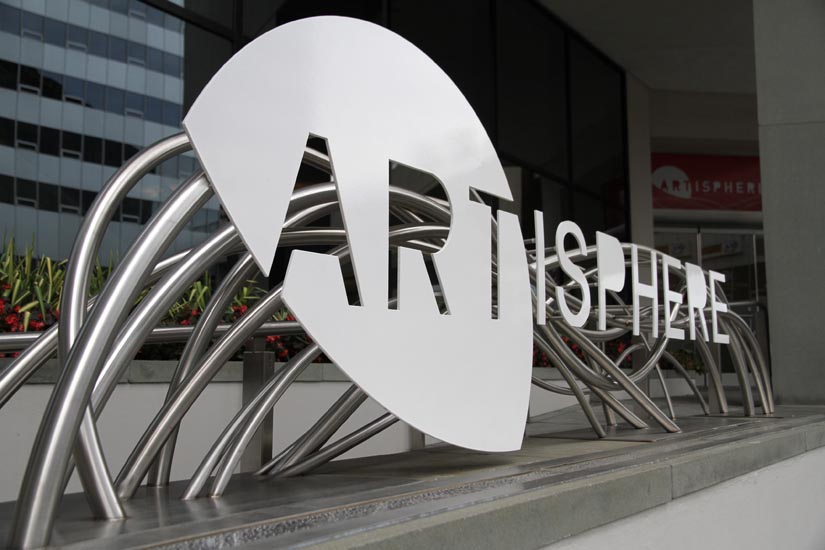Arlington's Artisphere, cultural planning and Arlington's identity
This book provides examples from 30 cultural centers that are members of the Trans-Europe Halles network.
The Post has an article, "Artisphere: 'Doomed from the start'," about the Rosslyn cultural center, Artisphere, which faces closure as Arlington County deals with budget problems.
To be honest, there isn't much for me to say or add, as the Post article is excellent in covering the issues around the story:
-- Rosslyn isn't particularly well-situated for a cultural facility as it isn't a night-time and weekend destination
-- it was unrealistic to expect the space to be revenue positive
-- that it should have been positioned as a cultural anchor contributing to the redefinition of Rosslyn as more than a center for office buildings and hotels
-- as well as to further Arlington's redefintion as a "city" as opposed to an "urban county."
Arlington has taken financial blows over the past couple years, between the Silver Line repositioning Greater Tysons in Fairfax County as transit-connected but a lower cost location for commercial space and the unwillingness of Congress to approve higher priced leases for federal agencies, which means that the National Science Foundation, an anchor of the county's science-technology sector, is moving to Alexandria to lower cost space.
-- "The state of Arlington County Virginia's commercial real estate market: 2012 and the future"
-- "Short term vs. long term thinking: transit, the Washington Examiner, Fairfax/ Loudoun Counties vs. DC"
-- "Silver line reshaping commercial office market in Fairfax County"
Not to mention reactions to the County's capital budgeting processes and projects--the "$1 million bus shelter," a proposed swimming facility in Crystal City, "the streetcar"--by the citizenry, culminating in the election of less growth oriented members of the County Board.
I see the unwillingness to fund Artisphere as one more result emanating from this narrative, but also Artisphere's "problems" are partly the result of timing.
Not just economic timing, but also a failure to recognize that it was probably too early to put a facility like Artisphere together in Rosslyn, given that the reshaping of the commercial district is in early stages, and hasn't reached velocity.
-- "Art, culture districts and revitalization"
In any case, it's another example of all communities needing more robust cultural planning and new models--one model being the cultural complexes that are present in many European cities. The Trans-Europe Halles network of 56 cultural centers across Europe are a good place to start.
Examples I am particularly impressed with include Helsinki's Cable Factory, La Friche in Marseille, and the Center for the Book in Aix-en-Provence (not a member of TEH).
Labels: arts-based revitalization, arts-culture, branding-identity, commercial district revitalization planning, cultural planning, music-entertainment





4 Comments:
somewhat off topic:
http://www.theatlantic.com/national/archive/2015/04/on-the-making-of-downtowns-from-fresno-to-seattle-to-shanghai/390873/
will check out. thanks.
2. at an estate sale yesterday, I picked up a copy of a Regional Plan Assn. book on _Urban Design Manhattan_, an exploration of urban design issues in Midtown, published in 1969.. More about that later.
3. am doing a piece on Greensboro, NC, which still has some industrial. Got put onto it from a PR query, but it turns out that there is some very interesting stuff happening there.
I did an interview this week, but I want to skim this book thinking it might have some stuff relevant to smaller cities like Greensboro. I have it at the LC, and skimmed it a bit Friday, but interestingly, it's mostly about what Richard Lloyd and Terry Clark call "the city as an entertainment machine."
http://www.amazon.com/dp/0415827663/ref=wl_it_dp_o_pC_S_ttl?_encoding=UTF8&colid=UCH00RLQE14T&coliid=I23VRZGOCUXXRM
also the WSJ has a story on Wabash, IN, as an example of smaller cities and their response to opportunities post recession.
4. the Manhattan book is really important though in terms of thinking of big CBDs. They even, in a couple of sentences, had the idea of car sharing... But mostly it's about managing the CBD for its growth, taking on the responsibility for coordinating and improving pedestrian flow, maintaining the success of the CBD, recognizing that transit is key to its ability to get so many people in and out, etc.
... off to the farmer's market and Takoma Earth Day
oh, it turns out that RPA has scanned a lot of their earlier regional plan initiative documents.
it's a great resource.
http://www.rpa.org/regional-plans
I saw that same book recently and may go back and get it.
Nice Blog
I am so impressd from your Blog
Arlington to boston taxi service
Post a Comment
<< Home